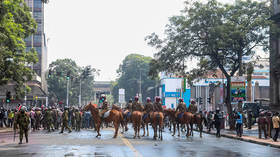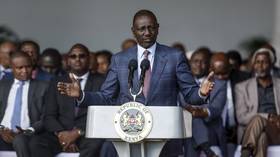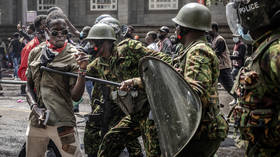A week of deadly clashes in Kenya: What we know so far

Kenya descended into chaos on Tuesday when riot police fired live rounds into crowds of protesters who had stormed the National Assembly to demonstrate against controversial tax increases demanded by the International Monetary Fund (IMF).
At least 22 people were killed by gunfire, according to a statement on Wednesday from the state-funded Kenya National Commission on Human Rights (KNHRC). It condemned the “excessive use of force by the police” during the protests, which erupted when lawmakers voted 195-106 to pass the government’s 2024 Finance Bill.
When did the protests start?
Youth-led protests initially broke out in Kenya last week in response to the government’s 2024 Finance Bill, which contains major tax hikes aimed at generating $2.7 billion in revenue, in line IMF demands.
As of last Thursday, more than 100 people had been arrested across the country, according to a joint statement by rights groups, including Amnesty International, the Kenya Medical Association, and the Law Society of Kenya.
The KNHRC said it had documented 336 injuries suffered by protesters and police officers, ranging from fractures to bullet wounds, since the protests began on June 18. So far, over 22 people have been abducted and 53 arbitrarily arrested, including doctors and lawyers, the commission claimed.
President backs down
On Wednesday, Kenyan President William Ruto declined to sign the Finance Bill 2024, which contained major tax increases and sparked the deadly riots and the demands for his resignation. Protesters claimed that the measure would exacerbate the already high cost of living.
Ruto had justified the plan to raise taxes on items such as bread, cooking oil, and diapers, claiming it was motivated by a need to lower Kenya’s high debt, which has made borrowing difficult and weakened the local currency.
The president said the legislation will be withdrawn because the people’s voices have been heard. Ruto had previously denounced the demonstrations as “treasonous events” and vowed to crack down on “organized criminals” who hijacked the “legitimate” marches and turned them into “violence and anarchy.”
Protesters continue to face-off with police
Despite President Ruto’s decision to abandon the bill, Kenyans on social media have vowed to continue the protests, this time demanding justice for those killed in previous demonstrations. Some have reportedly stated that they will not demonstrate on Thursday since the finance bill has been scrapped, while others have committed to continuing until Ruto resigns.
“We have to make sure that Ruto and his MPs have resigned and fresh elections are held... We occupy State House for dignity and justice,” political activist Davis Tafari told Reuters in a text message.
According to local media, Kenya’s government has deployed large numbers of riot officers in the capital, Nairobi. Roadblocks have also been erected on streets leading to the president’s residence and parliament, as protesters plan to storm the State House.
Capital FM reported that roads have been closed near the State House and major entry points into the Central Business District, where police have stationed trucks and patrol cars.
Several outlets reported low business activity, as most shops in Nairobi remained closed on Thursday. According to local television footage, hundreds of protesters gathered in the port city of Mombasa and the western town of Kisumu for peaceful demonstrations. However, clashes erupted in Migori, in the southwest of the country, with police using tear gas to disperse demonstrators, as reported by the BBC. The Kenyan daily The Standard said four people sustained gunshot wounds and two police officers had been injured during protests in Migori.
International response
The IMF, which has been advising the Kenyan government to make a “sizable and upfront” fiscal adjustment in its budget to reduce state borrowing, has said it is closely monitoring the situation in the African nation.
“We are deeply concerned about the tragic events in Kenya in recent days and saddened by the loss of lives and the many injuries,” IMF Communications Director Julie Kozack said in a statement on Wednesday.
The same day, United Nations Secretary-General Antonio Guterres said he too was “deeply saddened” by the reports of deaths and injuries connected to protests in Kenya. Moscow’s embassy in Nairobi also advised Russian citizens in the former British colony to avoid “crowded places” and comply with the requirements of local authorities.
In a joint statement on Tuesday, ambassadors and high commissioners from countries including Canada, Finland, the UK, the US, and Germany said they were deeply concerned by the violent incidents during the anti-tax protests and called for restraint on all sides.














